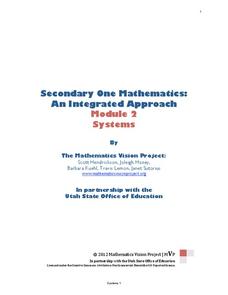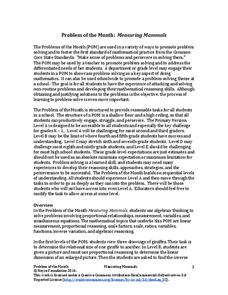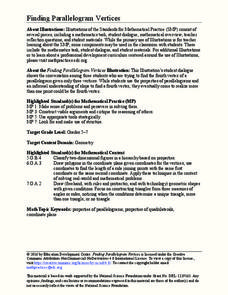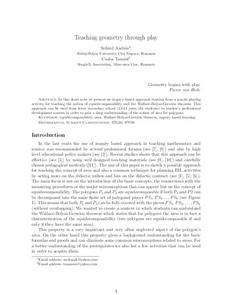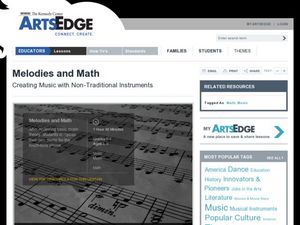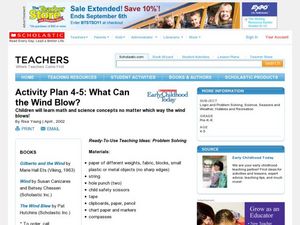Curated OER
Seas in Motion
Learners analyze wave movement. In this Science lesson plan, students use items that float to observe waves and currents. Learners record and discuss their observations.
Arizona Department of Education
Introduction to Integers
Welcome to the backward world of negative numbers. This introductory lesson plan teaches young mathematicians that negative numbers are simply the opposite of positive numbers as they use number lines to plot and compare single-digit...
National Security Agency
Are You Game? A Lesson Connecting Fractions and Probability
Exactly how fair are the board games children grow up playing? Young mathematicians investigate this questions as they work their way through this five-lesson series on basic probability.
Mathematics Vision Project
Module 2: Systems of Equations and Inequalities
The brother-sister pair Carlos and Clarita need your class's help in developing their new pet sitting business. Through a variety of scenarios and concerns presented to the siblings, the learners thoroughly explore systems of equations...
Illustrative Mathematics
Equal Area Triangles on the Same Base II
A deceptively simple question setup leads to a number of attack methods and a surprisingly sophisticated solution set in this open-ended problem. Young geometers of different strengths can go about defining the solutions graphically,...
Curated OER
Choosing a College
How can mathematics help scholars choose a college? High schoolers learn how they can use decision matrices to rank colleges based on selected criteria. They also see how to weigh criteria using multiplication of the decision matrix by a...
02 x 02 Worksheets
Absolute Value Equations and Inequalities
Demonstrate the meaning of an absolute inequality using three different methods. Here, scholars explore absolute value inequalities through graphing, number line distance, and compound inequalities. Pupils complete various activities to...
Noyce Foundation
Measuring Mammals
Explore the meaning of scale and proportion with a set of five activities that examines the topic from elementary through high school. The first lessons explore ratio by examining pictures of different sizes. The next three activities...
Education Development Center
Finding Parallelogram Vertices
Four is the perfect number—if you're talking about parallelograms. Scholars determine a possible fourth vertex of a parallelogram in the coordinate plane given the coordinates of three vertices. They read a conversation...
Concord Consortium
Yearbook Pictures
Sorting memories doesn't have to be difficult. Young mathematicians evaluate two different methods of sorting yearbook pictures. They answer a set of questions to explore each method, then develop their own sorting procedure based on...
Mascil Project
Teaching Geometry Through Play
Puzzle your way through to a new understanding of area. Scholars learn about the area of polygons through equidecomposability, the idea that polygons that can be decomposed into the same set of pieces have the same area. By using...
American Statistical Association
EllipSeeIt: Visualizing Strength and Direction of Correlation
Seeing is believing. Given several bivariate data sets, learners make scatter plots using the online SeeIt program to visualize the correlation. To get a more complete picture of the topic, they research their own data set and perform an...
Rochester Institute of Technology
Roots of Quadratic Equations
A five-page worksheet packet guides young mathematicians through solving standard form quadratic equations using the quadratic formula. They can identify the radical sign, the discriminant, and see the three options for finding roots...
Curated OER
Buses
Busy buses bustling back and forth. In this middle school assessment task, learners use information given in a graph to answer questions about bus schedules. They then determine how many times a bus passes by other buses going in the...
West Contra Costa Unified School District
Parallel Lines Cut by a Transversal
Parallel lines seem so right for each other. It's too bad they'll never, ever meet. Learners use tracing paper to discover relationships among angles formed by two parallel lines cut by a transversal. They apply this information to find...
Curated OER
Proving For The Crew
Students write math questions that pertain to the Lewis and Clark Expedition. In this math instructional activity, students utilize resources in the classroom to help write mathematical questions and answers that relate to the Lewis and...
Curated OER
Mental Multiplication and Division
Students practice multiplication and division problems using mental math. They play the online game ArithmAttack to complete as many multiplications or divisions as possible in 60 seconds. Afterward, they complete a paper based follow up...
Curated OER
Word Clue and All About Me Problem Solving
Fifth graders practice solving word problems using highlighted strategies. For this word problem lesson, 5th graders brainstorm and use words as clues that indicate the math operations that will be used to solve problems. They use the...
Curated OER
Decimals, Percent and Scientific Notation
In this decimals, percent and scientific notation learning exercise, 9th graders solve various types of problems that range from shading an indicated part of a shape to calculating using scientific notation to express their answer. They...
Curated OER
Melodies and Math: Creating Music with Non-Traditional Instruments
Review the 4/4 and 2/4 time signatures in music with a helpful music theory lesson plan. Young musicians experiment with electronic sounds and create their own musical performance using instruments made from materials found in the...
Curated OER
Investigation - Staci's New Car
Sixth graders solve math combination problems. In this combination problem solving lesson, 6th graders participate in a teacher led session in which they use tree diagrams and organized lists to determine all of the possible combinations...
Curated OER
ACC Basketball Statistics
Students use math skills and create a spreadsheet. In this statistics and computer skills lesson, students gather ACC basketball statistics, convert fractions to decimals and then percents. Students use the gathered information to create...
Curated OER
What Can the Wind Blow?
Students observe math and science concepts no matter which way the wind blows. In this early childhood problem solving instructional activity, students will develop science, math, and observation skills as they learn about the wind.
Curated OER
Deep Sea Drilling
Students explore ocean vessels that drill the ocean floor. For this ocean drilling lesson, students watch videos about drilling the ocean floor and discuss. Students get into groups, go outside and use string to mark off the amount of...





